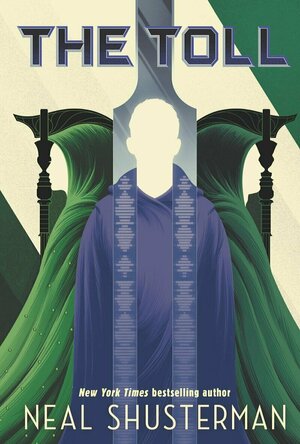A Bibliophagist (113 KP) rated The Toll (Arc of a Scythe, #3) in Books
Feb 5, 2020
The Toll picks up immediately after Thunderhead. Goddard has returned the MidMerica, no one knows that he was demoted to apprentice and with the death of Scythe Curie he stands uncontested for replacing Xenocrates. Anastasia and Rowan rest at the bottom of the ocean, and Goddard has made the site a site of remembrance to avoid any evidence being drudged up. The sinking of Endura is also squarely blamed on Rowan, and the world suffers as the Thunderhead punishes everyone, marking them unsavory. Cutting off communication with all but one, our former unsavory, Greyson.
With the rise of Goddard, the Schism amongst the Scythedom widens. He seizes more power, overturns rules and makes new ones and slowly starts taking control of other nations. Dubbing himself the Overblade. The story arches over 3 years post Thunderhead, and we jump around a little bit. During the three years Goddard continues to take a chokehold on the world, Greyson suddenly finds himself a living god amongst the tonists and humanity, as the only one able to speak to the thunderhead, he takes on the role of the Tonist's mythological figure, The Toll. Acting as a go-between, and manipulating those around him to fulfill the Thunderhead's goals.
Meanwhile, Faraday continues his search for the land of nod, making serious headway and discovering something that makes the Thunderhead uncertain. So the Thunderhead starts making plans. Faraday finds himself stranded with his helper, far away from the Scythedom, the Thunderhead and the horrible things that have been happening far away. He knows nothing of the fate of Marie, Goddard, Citra, Rowan, or the world. Finally, in the third year since the sinking of Endura, Rowan and Citra are raised from the depths, squirreled away by the Amazonian Scythes before Goddard knows they aren't dead. Being raised from the dead did wonders for Goddard's cause, so can Anastaisa's return do wonders for the plight of the old guard? But first Anastasia must plan and play her cards right, digging deep in the Thunderheads back brain to piece together mysteries long since written off and uncover the secrets of the Scythedom.
This book was really good, and a very satisfying finale to the series. The already rich worldbuilding is made richer by his choice to cut the world off from the Thunderhead, showing us what happens when people lose their connection to the world. He believably shows the influence one charismatic politician can have, and how easy it is for things to fall into disarray. You can tell he had a gameplan when he wrote these books, because everything comes together just right, not loose ends, everything had a purpose. Characters are tested, grow and develop. New parts of the world are further explored, completing the picture he begun in the other two books. I thoroughly enjoyed his take on the age-old sci-fi trope of "How does the benevolent computer protect humans from themselves". Well written, and elevated, especially in terms of other YA fiction. Shusterman really wrote a fantastic series. Once again, the romance is understated, but the emotions run deep enough at this point to pull at your heartstrings and make you believe in their love, even if it came from somewhat unbelievable beginnings.
This series is well worth the read, and a breath of fresh air in an otherwise stale and formulaic YA world.
Kirk Bage (1775 KP) rated Call Me by Your Name (2017) in Movies
Mar 3, 2020
Continuing to catch up on Oscar nominated films of recent years I have missed, I went on holiday in 1982 Italy for 2 hours last night. There was culture, architecture, piano music, food, nature, and a big peachy dollop of sensuality – thinly veiled as dramatic cinema. It washed over me like a daydream! And if I say nothing really happens, I wouldn’t necessarily call it a criticism. It ambles along at such a languid pace at times, with such little conflict or incident, but to call it insignificant would be a disservice to the power of love at its palpable heart.
Essentially, it is a right of passage movie, that defies gloriously every hollywood habit of over egging the souffle. For minutes on end we watch Elio, the formidable natural talent of Timothée Chalamet, read a book, go for a swim, ride a bike, play the piano, or fuck some fruit, as he gradually descends into obsession, and ultimately love, for the older Armie Hammer as the aloof and seemingly worldly Oliver, his father’s research assistant for the Summer.
It feels for a long, long time like you might not care, such a tale of rich privilege as it is; but, by the final moments you do realise you have been drawn into the depth of feeling that is often hidden in plain sight, and that you may after all relate to the heartbreak contained in loving an idea of love and passion that is never attainable in reality. The self discovery of a passion within you as a life force is a melancholy reward in and of itself.
I know already that I must return to this film from time to time in a variety of moods, because it has a depth of subtlety that may catch me differently every time; and that is its main power. The key to which is Chalamet. His eyes and body language are so filled with hidden wonders that his words don’t always convey, that his work seems more like a strange dance than your average screen performance, that often simply takes the script and merely reads it aloud.
The remarkable career of Michael Stuhlbarg, as Elio’s father, is also noteworthy here. Take a look at how many great films he has now been a part of and gasp to think, oh wow, that is the same guy! His paternal speech to Elio at the end of this film was a highlight for me. Such gorgeous writing, that combines character with wisdom and weakness in a tapestry of care and regret. Just wonderful.
You know, I came into writing this review feeling that I had found the experience quite disposable and slight. That clearly isn’t the case. This is obviously a film you must watch again, meeting it where it wants to meet you. Not to mention I have always been a Sufjan Stevens fan, and found his contribution to the musical landscape near perfect. In conclusion, there is a banquet here masquerading as a taste of something sweet brushing the lips. I will be back for a second bite in time.

Speakaboos - The Reading and Learning App for Kids
Education and Book
App
The only reading app designed to motivate kids to read! ** Over 200 interactive stories & songs that...

Old Macdonald Had a Farm.
Education and Games
App
~~~ More than 2,000,000 Downloads! Selected New and Noteworthy ~~~ ~~~ Interactive Old Macdonald’s...

Brick Body Kids Still Daydream by Open Mike Eagle
Album Watch
With the first song of his 2014 masterpiece, Dark Comedy, Open Mike Eagle reintroduced himself by...
rap

Remoter VNC - Remote Desktop
Productivity and Utilities
App
● Full resolution support for the iPad Pro ● ●● SSH Key import via clipboard added, SSH on...

System Activity Monitor - Battery, Free Memory
Productivity and Utilities
App
Take a deep dive into your iPhone/iPad to see whats going on inside. System Activity Monitor App, is...

Piano app by Yokee
Music and Games
App
-- PLAY THE HOTEST SONGS. NO EXPERIENCE NECESSARY. -- Play timeless Piano classics and popular radio...

Alto - Email Organized for You
Productivity and Utilities
App
Control. It’s not just for Janet Jackson anymore. Alto hands you back the reigns to your inbox....

iBillionaire - Save More
Finance and Business
App
Save money automatically & invest with unlimited access to the same information and insights that...

